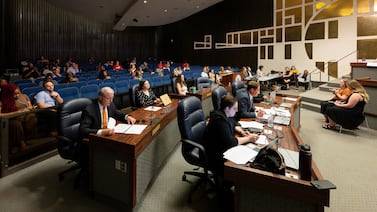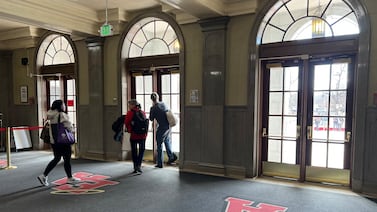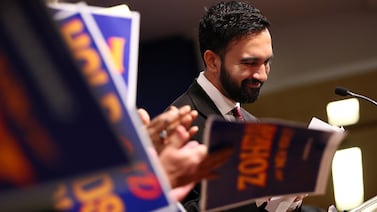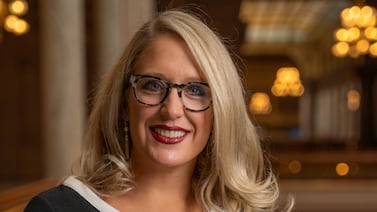Newark families will have a harder time switching schools this year due to changes in the city’s online enrollment system.
In the past, parents who were dissatisfied with their children’s assigned schools could independently transfer to schools with open seats using the online enrollment tool. The revamped system that launched this school year removes that option. Now, families will have to apply for transfers and the district will only grant them in certain cases, such as when a child requires a school with a special education program.
The policy change is likely to frustrate families who weren’t assigned to their top-choice schools for the fall or were matched with schools they didn’t even apply for in the Newark Enrolls system. Charter school advocates also say the change may contradict state law, which requires charter schools to admit any students who apply if seats are available.
At a school board meeting this week, Superintendent Roger León acknowledged that some families are unhappy with their assigned schools, which the district shared with families in match letters last week after a two-month delay due to the coronavirus. “Now people are like, ‘Well, what do I do if I don’t want to go to this school versus that school?’” he said Tuesday.
But León argued that it is necessary to restrict transfers because repeated school roster changes can cause disruptions. He did not elaborate, but it could be difficult for a student to start at a new school multiple times.
“Definitely you should want to have your child in whatever school you want your child in,” he said. “But moving your child from one school to another school to another school to another school is not creating stability.”
It is not clear how common it is for parents to transfer schools multiple times, and León did not provide data on transfers. District officials have previously said that allowing unrestricted transfers creates a risk that families will switch to schools that are not good fits, including ones that lack special programs a student may require.
Families with children entering kindergarten or high school in the fall, or those hoping to change schools, had until Feb. 14 to apply to up to eight schools through Newark Enrolls. They could choose among more than 60 district-run schools and 11 charter schools that participate in the universal enrollment system, which the district manages. Newark’s other seven charter operators hold their own admissions lotteries.
Families who missed the initial enrollment period can apply to schools online beginning June 1.
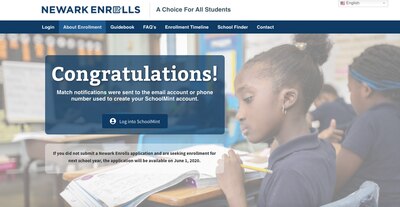
Families who already applied but don’t want the school their child was matched with have two options, according to the district’s new policy. If they are seeking spots in the district’s magnet schools, which admit students based on their academic records and other factors, they can contact the principals and request a spot.
If they are interested in any other district or charter schools, they must submit a request through the enrollment system. The district will only grant transfer for three reasons: the family would have to travel a long distance to reach their assigned school, a student requires a special-education or bilingual program that their assigned school does not offer, or attending the assigned school would pose a safety risk to the student.
“In all cases, when a transfer request is submitted, we will review the availability at that moment in time in the district and make the best decision that meets the needs of the family,” Havier Nazario, León’s chief of staff, said during the board meeting.
The new transfer policy raises legal concerns according to Harry Lee, president of the New Jersey Public Charter Schools Association advocacy group representing charter schools, which are publicly funded and independently operated. If the district denies a family’s request to transfer to a charter school with open seats because the request does not meet the district’s new criteria, that could put the charter school in violation of the state law that says charters must admit any students they have space for, Lee said.
“Legally, NPS does not have the statutory authority to prevent a student from attending a charter school that has an open seat,” he said, referring to Newark Public Schools. “This policy flies in the face of what’s permitted through charter law.”
Lee said multiple charter school leaders he’s spoken with have reported other issues with this year’s match process. For instance, some students who ranked the schools first on their applications were not matched with the schools even when seats were available, Lee said. And some students who live outside the city were placed in schools ahead of Newark residents, despite state rules giving residents priority.
In response to the residency issue, a district spokeswoman said some charter schools are allowed to enroll non-Newark residents, and families who have been displaced from their Newark homes still have a right to attend city schools. Regarding waitlist issues, the spokeswoman pointed to the district’s policy guide, which says students were added to charter school waitlists if they were matched with schools lower on their applications. District schools do not have waitlists.
At Tuesday’s board meeting, León noted that some families did not receive their preferred placements because some schools had more students apply than they can accommodate. In such cases, students are matched to the first school on their application that has open seats. If all of their chosen schools are filled, then students are matched to the district schools nearest their home.
“Which may have been a school you did not choose to go to,” León said, “but it is the school you’ve been matched to.”
Rafeeah Adewole is one of the students hoping to be granted a transfer. An eighth-grader who earned straight A’s at Marion P. Thomas Charter School, she applied to several magnet schools and a high-performing charter high school. She did not get any of her top choices. Instead, the district matched her with a traditional high school that she included on her list only as a last resort.
“When I was rejected, I felt like, what could I have done better?” she said. “Was I not good enough?”
Her older brother Rasheed is helping her appeal. They already emailed one magnet school principal and plan to contact others. Rasheed, who is a rising senior at Franklin & Marshall College, said he doesn’t understand why his high-achieving sister was matched with her bottom-ranked school. But he has encouraged her to keep fighting for her top choice.
“You’ve got to advocate for yourself regardless of what the system is and hopefully someone will be able to help her out,” he said. “She’s not going to give up hope.”



